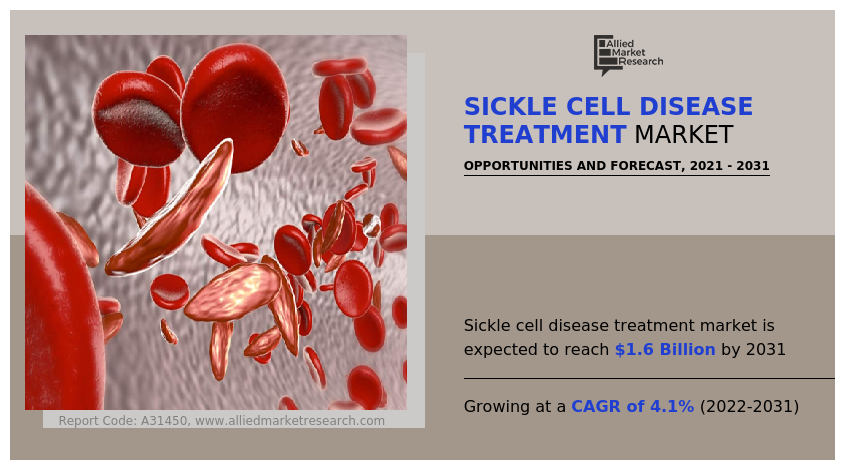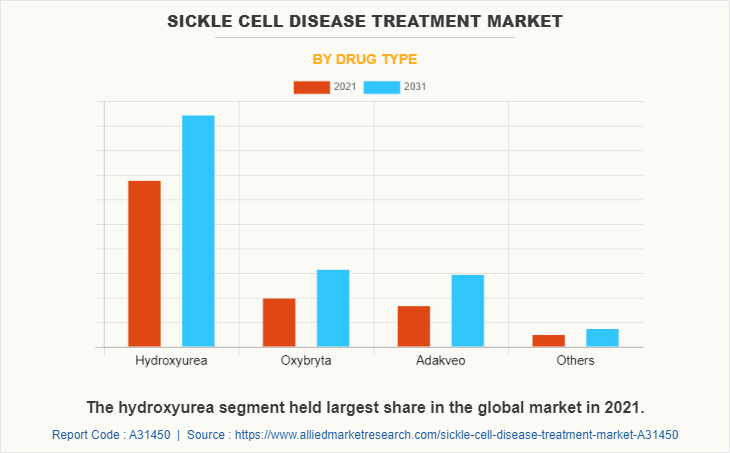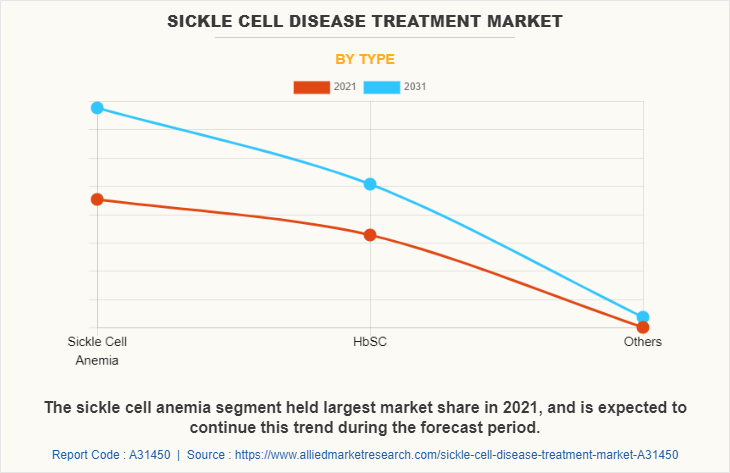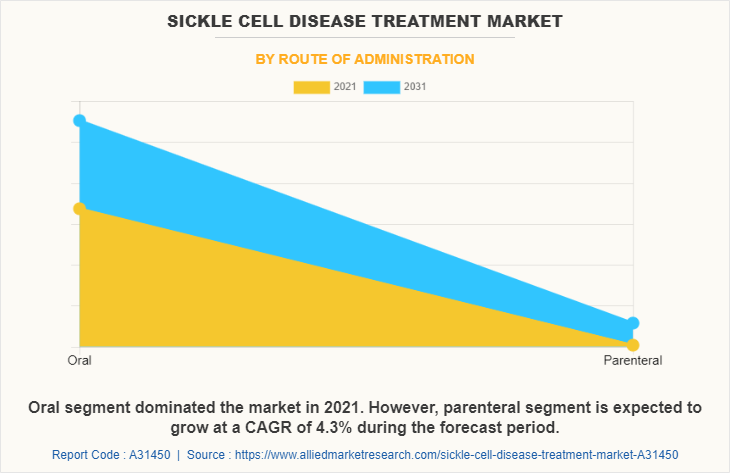Sickle Cell Disease Treatment Market Research, 2031
The global sickle cell disease treatment market size was valued at $1.1 billion in 2021, and is projected to reach $1.6 billion by 2031, growing at a CAGR of 4.1% from 2022 to 2031. Sickle cell disease (SCD) is a category of inherited red blood cell disorders, which is caused by genetic mutation that affects the hemoglobin. Red blood cells contain hemoglobin that carries the oxygen. In sickle cell disease, the red blood cells are affected and become sickle shape, which leads to abnormal hemoglobin and improper blood flow. Shortness of breath and fatigue are the two common symptoms of sickle cell disease. Hydroxyurea and Endari are the only two drugs approved for sickle cell disease treatment. Moreover, the upcoming commercialization of promising pipeline drugs, such as voxelotor, CTX001 and Mitapivat is expected to drive the market growth.

The increase in prevalence of sickle cell disease is the key factor that drives the global sickle cell disease treatment market growth. In addition, increase in government support for healthcare infrastructure improvements and robust research and development (R&D) initiatives further boost the growth of the market. Moreover, rise in initiatives taken by government of various countries such as U.S. and Africa for promoting access programs for sickle cell disease patients drive the growth of the market. For instance, in Ghana, program was launched in 2019 for expanding the treatment for sickle cell disease.
However, high cost of treatment associated with sickle cell disease and side effects associated with sickle cell disease drugs such as headache, nausea, diarrhea, fatigue, rash, and fever are expected to hamper the growth of the sickle cell disease treatment market. In contrast, increase in investments by key players toward R&D related to sickle cell disease treatment is expected to provide beneficial sickle cell disease treatment market opportunity.
Impact of COVID-19
The outbreak of COVID-19 disrupted workflows in the healthcare sector across the world. The disease has forced a number of industries to shut their doors temporarily, including several sub-domains of healthcare. However, there has also been a negative effect on sickle cell disease treatment market, including decrease in sales of sickle cell disease drugs. In addition, disruption of supply chain for sickle cell disease drugs during COVID-19 restrains the market growth. Furthermore, decrease in hospital admissions due to lockdown is expected to negatively impact the sickle cell disease treatment industry.
Moreover, the market was anticipated to witness recovery in 2021, and show stable growth for sickle cell disease treatment in the coming future. Furthermore, decrease in hospitalizations, ER visits, duration of stay, and opiate use for sickle cell disease during COVID-19 also hamper the market growth. For instance, according to American Society of Hematology (ASH), the inpatient admission for sickle cell disease treatment decreased to 79 in 2020 from 107 in 2019. Thus, COVID-19 negatively impacts on the sickle cell disease treatment industry.
SICKLE CELL DISESAE TREATMENT MARKET SEGMENTATION
The sickle cell disease treatment market size is segmented into drug type, type, route of administration, and region. Depending on drug type, the market is categorized into hydroxyurea, oxbryta, adakveo, and others. By type, it is classified into s sickle cell anemia or HbSS, HbSc, and others. On the basis of route of administration, it is classified into oral and parenteral. Region-wise, the market is analyzed across North America (the U.S., Canada, and Mexico), Europe (Germany, France, UK, Italy, Spain, and rest of Europe), Asia-Pacific (Japan, China, Australia, India, South Korea, and rest of Asia-Pacific), and LAMEA (Brazil, Saudi Arabia, South Africa, and rest of LAMEA).
Segment Review
Depending on drug type, the market is segmented into hydroxyurea, oxbryta, adakveo, and others. The hydroxyurea segment dominated the global sickle cell disease treatment market share in 2021. Hydroxyurea is an ideal drug for sickle cell anemia and provides therapeutic benefit through multiple mechanism of action, which drives the growth of the segment. However, the adakveo segment is projected to exhibit the fastest market growth during the forecast period. This is attributed to rise in consumption of Adakveo drug for the treatment of condition vaso-occulsive crisis (VOC) occurred due to sickle cell disease, which further rises demand for Adakveo during forecast period.

On the basis of type, the market is segmented into sickle cell anemia or HbSS, HbSC, and others (HbS beta thalassemia, HbSD, HbSE, and HbSO). The sickle cell anemia segment accounted for the largest revenue in 2021 and is expected to remain dominant during sickle cell disease treatment market forecast period, owing to rise in complications associated with of sickle cell anemia, such as hemolysis and vaso-occlusive crisis (VOC).

On the basis of route of administration, the market is segmented into oral and parenteral. The oral segment accounted for the largest revenue in 2021, owing to high adoption of orally drugs due to noninvasive, high patient compliance, convenient to handle, and does not require any specific sterile conditions. For instance, hydroxyurea are available in tablet and capsule form, which is administer by oral route in the patients of sickle cell disease.

Region-wise, North America acquired a major sickle cell disease treatment market share in 2021, owing to the presence of key players, rising government initiatives, well-developed healthcare infrastructure, and rising prevalence of sickle cell disease. In addition, product approvals for sickle cell disease further boost the market growth. For instance, in 2017, Food and Drug Administration (FDA) approved the product, Endari for sickle cell disease treatment for patients aged between 5 years and older.
However, Asia-Pacific is expected to witness the highest growth rate for the sickle cell disease treatment market during the forecast period with a CAGR of 5.7%. The major factor that drives the growth of the sickle cell disease treatment market in this region includes, increase in prevalence of sickle cell disease. In addition, technological advancements and increase in government initiatives to promote healthy lifestyle drive the market growth. Moreover, development of new therapies for sickle cell disease and government support to pipeline drugs for sickle cell disease further propel the market growth.
The key market players profiled in the report include, Agios Pharmaceuticals, Bristol Myers Squibb Company, CRISPR Therapeutics, Editas Medicine, Emmaus Life Sciences, Inc., Global Blood Therapeutics, Inc., Medunic USA, Inc., Novartis AG, Novo Nordisk, and Vifor Pharma.
Key Benefits For Stakeholders
- This report provides a quantitative analysis of the market segments, current trends, estimations, and dynamics of the sickle cell disease treatment market analysis from 2021 to 2031 to identify the prevailing sickle cell disease treatment market opportunities.
- The market research is offered along with information related to key drivers, restraints, and opportunities.
- Porter's five forces analysis highlights the potency of buyers and suppliers to enable stakeholders make profit-oriented business decisions and strengthen their supplier-buyer network.
- In-depth analysis of the sickle cell disease treatment market segmentation assists to determine the prevailing market opportunities.
- Major countries in each region are mapped according to their revenue contribution to the global market.
- Market player positioning facilitates benchmarking and provides a clear understanding of the present position of the market players.
- The report includes the analysis of the regional as well as global sickle cell disease treatment market trends, key players, market segments, application areas, and market growth strategies.
Sickle Cell Disease Treatment Market Report Highlights
| Aspects | Details |
| Market Size By 2031 | USD 1.6 billion |
| Growth Rate | CAGR of 4.1% |
| Forecast period | 2021 - 2031 |
| Report Pages | 292 |
| By Drug Type |
|
| By Type |
|
| By Route of Administration |
|
| By Region |
|
| Key Market Players | editas Medicine, Agios Pharmaceuticals, Vifor Pharma, Novartis AG, Novo Nordisk, Global Blood Therapeutics, Inc., Medunic USA Inc., Emmaus Life Sciences, Inc., CRISPR Therapeutics, Bristol-Myers Squibb |
Analyst Review
Sickle cell disease is an inherited blood disorder that affects the hemoglobin and changes the shape of red blood cells, which leads to blockage of blood flow. The sickle cell disease drugs are used to treat symptoms of sickle cell disease.
The global sickle cell disease treatment market is expected to exhibit high growth potential, attributable to factors such as, increase in prevalence of sickle cell disease condition and rise in R&D activities of sickle cell disease drugs. Moreover, increase in demand for sickle cell disease drugs contributes toward the growth of the market
North America is expected to witness the highest growth, in terms of revenue, owing to rise in prevalence of sickle cell disease, rise in healthcare expenditure, and strong presence of key players. However, Asia-Pacific is anticipated to witness notable growth, owing to unmet medical demands and rise in R&D pipeline products for sickle cell disease during the forecast period.
Sickle cell disease is an inherited blood disorder that affects the hemoglobin and changes the shape of red blood cells, which leads to blockage of blood flow.
Hydroxyurea segment dominated the global market in 2021, owing to high adoption of hydroxyurea due to rise in prevalence of sickle cell disease
Top companies such as Global Blood Therapeutics, Inc., Novartis AG, Bristol Myers Squibb Company, and Emmaus Life Sciences held a high market position in 2021.
Increase in prevalence of sickle cell disease, rise in pipeline products, and surge in demand for sickle cell disease drugs drives the market growth are the key growth factor for the market.
The market value of sickle cell disease treatment market in 2022 is $1,618.78 million.
The base year is 2021 in sickle cell disease treatment market
The total market value of sickle cell disease treatment market is $1,078.88 million in 2021.
The forecast period for sickle cell disease treatment market is 2022 to 2031
Loading Table Of Content...


